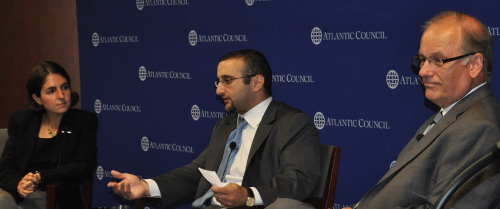On May 23rd, the Atlantic Council’s Middle East Peace and Security Initiative at the Brent Scowcroft Center on International Security hosted a panel discussion on new developments in security cooperation among the United States, its European allies, and the Gulf States, and how they are likely to evolve in the coming years. Mr. Barry Pavel, director of the Brent Scowcroft Center, moderated the panel constituted of Vice Admiral Kevin Cosgriff, former commander of the US Naval Forces Central Command; the Honorable Franklin D. Kramer, a distinguished fellow at the Atlantic Council; and Dr. Jean-Loup Samaan, researcher and lecturer at the NATO Defense College.
Kramer opened the discussion by explaining that US strategic priorities in the region used to be very simple: preserving political stability, maintaining the free flow of oil, and ensuring the security of Israel. He also noted the strategic landscape is much more complex since the Arab Spring, the arrival of China as a regional player, concerns about non-proliferation, and changing perceptions about counter-terrorism. For all these reasons, stability is no longer a word that can be used to describe this part of the world, no matter how desirable it may be.
Cosgriff stated that the Gulf’s importance as a supplier of global energy and concerns about extremism in and around the region will ensure that it remains a strategic priority for the United States. Cosgriff argued that countries like the United Kingdom and France will join the United States in maintaining their security posture in the region. This, however, does not mean that Gulf States do not aspire to shoulder more of their own security. Some of them, like the United Arab Emirates and Saudi Arabia, are capable of doing so and already have the best equipment money can buy.
Cosgriff warned against what Gulf countries perceive as US ambiguity in the region. He said that they understood what President George W. Bush and his administration were doing in the region – even if they disagreed with it – but that Gulf countries do not have a clear idea about what the Obama administration seeks in the region. Cosgriff argued that with the imminent drawdown in Afghanistan, there is some uncertainty about exactly what type of presence the United States will maintain in the region militarily. Cosgriff called for the United States and its European allies to recommit unambiguously diplomatically and militarily to the region.
After two American voices, Dr. Jean-Loup Samaan offered a European perspective on these issues. He underlined that Gulf security was ranked fourth in the priorities of the new French White Paper on Defense and National Security. According to France, Iran’s pursuit of nuclear capabilities is the biggest threat to the region’s stability. Samaan explained that the Arab uprising raised the level of diplomatic and political cooperation between European and Gulf countries. They have common agendas that encourage them to cooperate, such as the decision not to negotiate with a nuclear-armed Iran. However, he also noted that these partnerships might be lacking a strategic long-term plan. France and United Kingdom’s involvement seem to be driven by economic needs due to austerity rather than long-term strategy. With the economic crisis, they need to find new markets to export their goods, and in particular arms. Dr. Samaan also said that in light of cuts to defense spending, Europeans lacked the military means to influence the security of the region, which could jeopardize their strategic position there. A proof of that is the fact that Gulf countries increasingly rely on the United States rather than on Europeans for their security. He also pointed out that while a desire to see the Assad regime forced from power has brought the West and the Gulf together, it could also end up tearing them apart. Indeed, Gulf States want to get rid of Assad at all costs, whereas Europeans are more cautious about the prospect of Salafists replacing Assad’s secular regime.
The event then opened up for questions in which topics such as the political instability in Bahrain, Iran’s perception of western security engagement in the region, and the trade-off between values and interests were discussed. The responses, as well as the initial presentations, helped the audience—comprised of embassy staff, business leaders, regional activists, military officials, and the general public—to better understand the implications of this new reality.
Image: web_4.jpg
